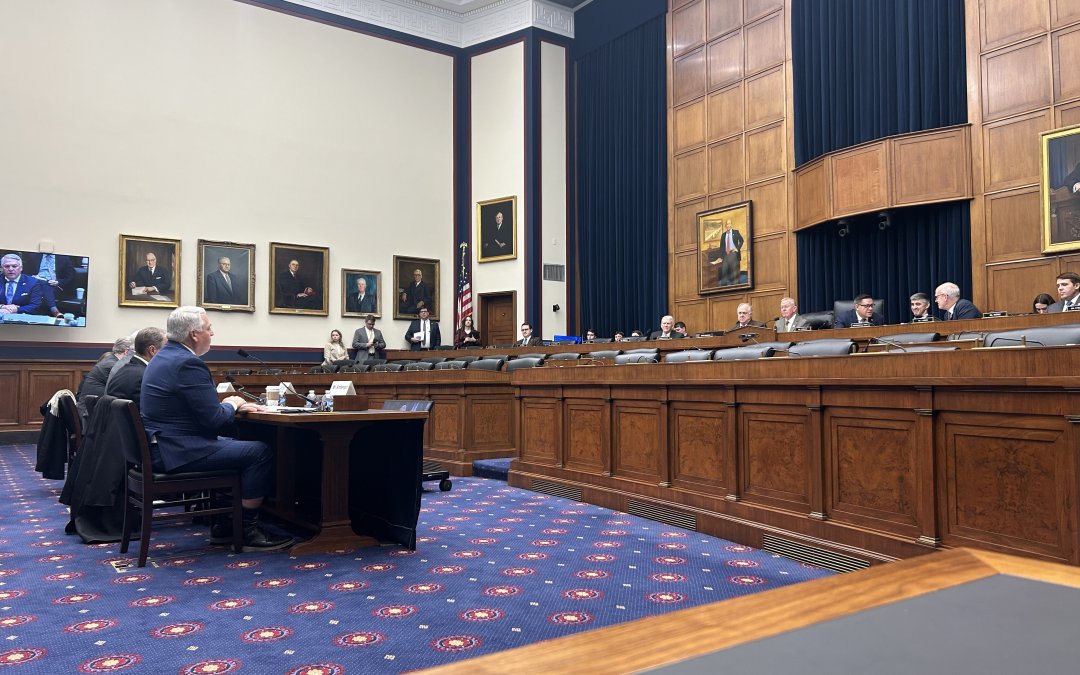WASHINGTON – Maritime industry experts emphasized uncertainty in the United States’ ability to compete with China on the global stage after federal funds for maritime infrastructure were paused by President Donald Trump.
“We are on the brink of failure,” said Brian Schoeneman, the political and legislative director of the Seafarers International Union of North America, which is focused on the rights of mariners and seamen.
“We as a nation have not made maritime infrastructure our priority,” he said.
At their Wednesday morning hearing, the House Committee on Transportation and Infrastructure subcommittee on the Coast Guard and Maritime Transportation discussed how the U.S. can build and improve maritime infrastructure despite President Donald Trump signing the “Unleashing American Energy” executive order on his first day in office.
The order stopped federal funding towards the infrastructure provisions of the Inflation Reduction Act as well as funding to ports and maritime-oriented companies to improve technology and resources that could counter international competition.
Despite large land borders with its biggest trading partners – Canada and Mexico – the U.S. relies heavily on its ships and ports. The U.S. Bureau of Transportation Statistics reported that 57% of the 2.6 billion short tons, 5.2 trillion pounds, of cargo that moved through U.S. ports in 2022 were imports or exports.
That same year, according to the National Oceanic and Atmospheric Administration, the marine economy supported 2.4 million jobs. Witness Paul Anderson, the president and chief executive officer of the Port of Tampa Bay who previously served on President George W. Bush’s Federal Maritime Commission and Committee on Marine Transportation pointed to the impact of mariners on the Tampa Bay, Fla. community.
“Shipbuilding and repairs is also…woven into the history of the port,” he said.
The Bipartisan Infrastructure Law, which was signed by President Joe Biden in 2021, provided $17 billion for investment in waterways and important port infrastructure. The bill’s funding expires in two years.
“It’s absolutely critical that ports continue to receive funding,” Anderson said.
In 2022, the Inflation Reduction Act provided additional funding for maritime infrastructure that prioritized climate change mitigation.
The pause in federal funding towards acts like the Bipartisan Infrastructure Law and Inflation Reduction Act as well as federal grant programs aimed at developing maritime infrastructure like the Small Shipyard Grant Program and the Port Infrastructure Development Program makes it more difficult for companies to do more than “get by,” said Joe Rella, the president of St. Johns Ship Building, Inc.
New technology would provide the U.S. a much needed boost in the competition with China, said Schoeneman.
“We’re definitely behind,” said Tom Reynolds, the chief strategy officer at Seasats Inc., a company that creates autonomous water vessels for science, defense, and commercial purposes. He was at the hearing on behalf of the Association for Uncrewed Vehicle Systems International.
Rep. Mike Ezell (R-Miss.), the chairman of the subcommittee, described his desire for a “robust maritime infrastructure” along the Gulf Coast in his home state. But the witnesses all said that is unlikely without funding from the federal government.
The Jones Act was established in 1920 to regulate maritime commerce and define seaman’s rights. “We wouldn’t be here as a country with no Jones Act,” Schoeneman, who testified at the hearing on behalf of USA Maritime, said.
Scheoeneman also asserted that “wherever we walk away, China walks in,” adding that the end of the U.S. Agency for International Development would have a detrimental effect on mariners who would lose their jobs and on U.S. national security.
The loss of American jobs because of changes in funding would be a part of a larger pattern, something that Reps Chris Pappas (D-N.H.) and Marilyn Strickland (D-Wash.) were concerned with. “No one wants to get started in an industry people think is dying,” Shoeneman said.
All of the experts urged Congress to provide more funding for maritime infrastructure.
“I would rate our infrastructure a solid C,” Schoeneman said. “There is much work to be done.”


